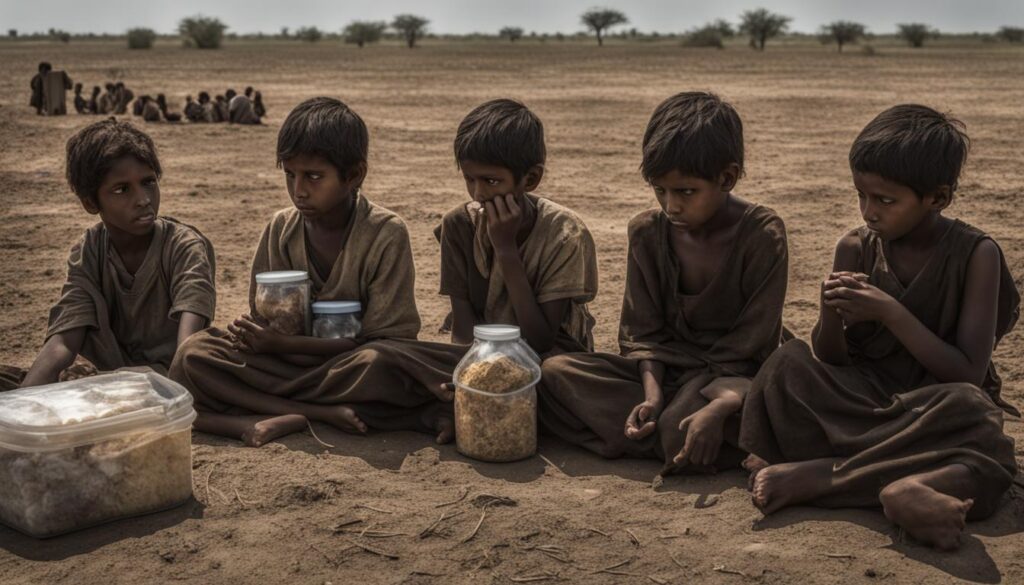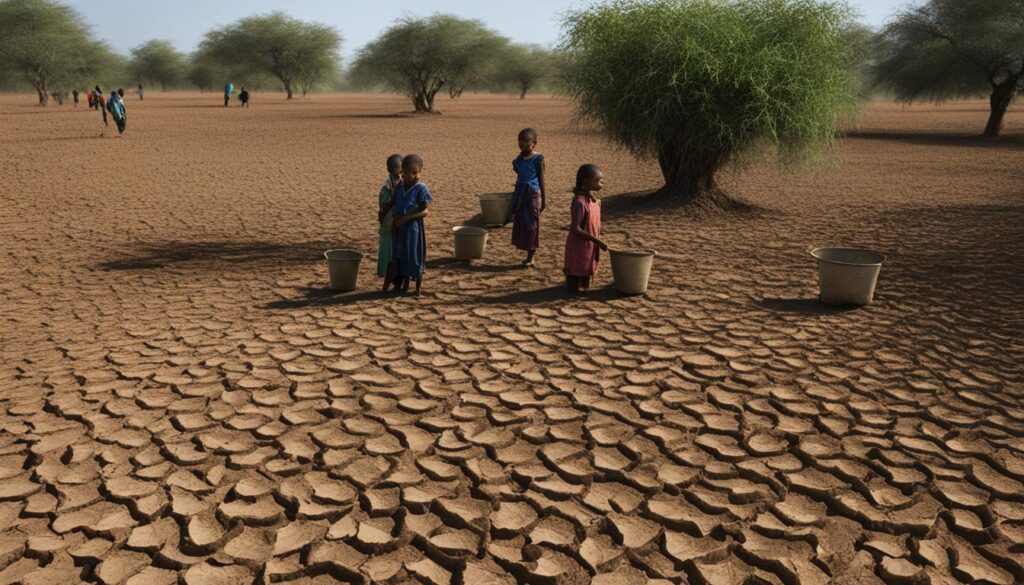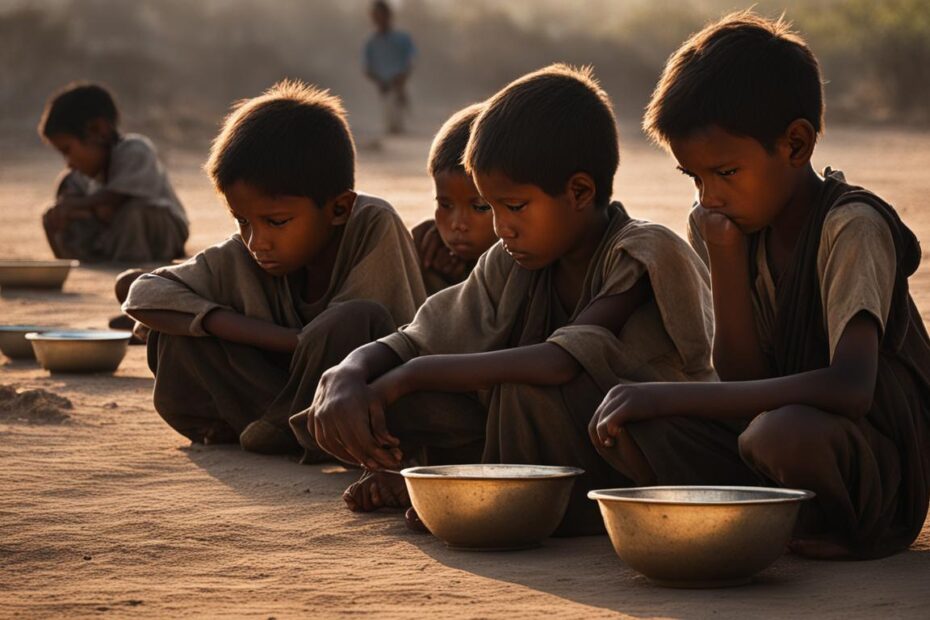When faced with the heartbreaking reality of starving children, many find solace and hope in the power of prayer to Jesus Christ. However, skeptics raise questions about the effectiveness of prayer and whether divine intervention truly occurs. In this article, we will examine the contrasting perspectives on this issue, exploring the role of faith in Jesus, the nature of prayer requests, and the importance of spiritual guidance.
Key Takeaways:
- Prayer to Jesus Christ is a source of comfort and hope for those concerned about starving children.
- Skeptics question the effectiveness of prayer and the occurrence of divine intervention.
- Faith in Jesus and spiritual guidance play crucial roles in understanding the nature of prayer.
- Exploring personal testimonies and medical evidence can provide insights into the power of prayer.
- The ongoing suffering of starving children raises profound questions about God’s response to prayer.
The Question of God’s Role in Feeding Starving Children
When it comes to the humanitarian crisis of starving children, many people question the role of God. They wonder why God does not intervene to alleviate the suffering and ensure that every child has enough to eat. It’s important to recognize that the issue of global hunger is not solely a matter of a lack of food. Instead, it is primarily due to issues related to access and distribution.
About one-third of all food produced each year is wasted or lost before it can be consumed. This staggering amount of food wastage, which totals approximately 1.3 billion tons per year, could be used to feed two billion people. It is clear that the problems of hunger and food shortages are often rooted in human factors such as greed, corruption, mismanagement of resources, conflicts, and inefficient food distribution systems.
“The problems of hunger and food shortages are often caused by human greed, corruption, war, mismanagement of resources, conflicts, and food wastage.”
Therefore, the responsibility to feed the hungry falls not solely on God, but on individuals, organizations, and ministries that are willing to address the issue. It is through the demonstration of love, kindness, and compassion that we can make a difference in the lives of starving children. By supporting initiatives that focus on improving access to food, advocating for fair distribution systems, and actively participating in efforts to combat hunger, we can be instruments of hope and change.

The Impact of Humanitarian Efforts
Humanitarian organizations and charities play a crucial role in addressing hunger and providing support to those in need. Through their dedicated work, they strive to reach vulnerable children and ensure they have access to nutritious meals. These organizations often operate in areas affected by conflicts, natural disasters, and extreme poverty, where the need for assistance is urgent.
By partnering with local communities, implementing sustainable agricultural practices, and promoting education and empowerment, these organizations work towards long-term solutions to hunger. They not only provide immediate aid but also focus on equipping communities to be self-sufficient and resilient. Together, we can support these efforts and contribute to a world where no child goes to bed hungry.
The Sinful Nature of Humanity and Its Impact on Suffering
The suffering that exists in the world is not a result of God’s actions, but rather stems from the sinful nature of humanity. It is the consequences of human greed, corruption, and the mismanagement of resources that directly and indirectly contribute to poverty and suffering. Wars, conflicts, and other acts of injustice have devastating effects on communities and exacerbate the problem of hunger and poverty. The Bible teaches us that all people have sinned, and it is this sin that has brought about suffering and brokenness in the world.
Human greed and corruption, in particular, play a significant role in perpetuating poverty and inequality. When individuals prioritize their own selfish desires over the needs of others, it leads to the exploitation and marginalization of the most vulnerable. The consequences of such actions are evident in the vast disparities between the rich and the poor, as well as in the inequitable distribution of resources.
“The suffering in the world is not a result of God’s actions but rather the sinful nature of humanity.”
To overcome suffering and injustice, it is essential for individuals to demonstrate love, kindness, and humility, guided by the teachings of the Bible. The Bible speaks of the fruit of the Holy Spirit, which includes love, joy, peace, patience, kindness, goodness, faithfulness, gentleness, and self-control. When individuals strive to embody these qualities in their actions and interactions with others, they contribute to the healing and transformation of their communities.
Addressing the sinful nature of humanity requires a collective effort. It is not enough for individuals to change their behavior; there must also be a commitment to addressing systemic issues such as poverty, inequality, and corruption. This requires the involvement of governments, organizations, and communities working together to create a more just and compassionate society. By addressing the root causes of suffering and injustice, we can begin to build a world where everyone has access to the resources they need to thrive.

The Impact of Human Greed and Corruption on Suffering
| Problem | Impact |
|---|---|
| Poverty | Human greed and corruption perpetuate poverty by exacerbating income inequalities and limiting access to resources. |
| Inequality | Unethical practices fueled by human greed and corruption contribute to the widening gap between the rich and the poor. |
| Exploitation | Greed and corruption enable the exploitation of vulnerable individuals and communities, leading to increased suffering. |
| Lack of Basic Needs | Corruption in governments and organizations hinders the fair distribution of resources, depriving many of access to basic needs such as food, water, and healthcare. |
Addressing the Sinful Nature of Humanity: Key Steps
- Recognize and acknowledge the reality of human sin and its impact on suffering and injustice.
- Embrace the teachings of the Bible and strive to embody the fruit of the Holy Spirit in our actions and relationships.
- Advocate for systemic change by supporting policies and initiatives that promote justice, equality, and accountability.
- Engage in acts of compassion and service to alleviate immediate suffering and support those affected by poverty and injustice.
God’s Love for Children and His Care for the Young
When it comes to the topic of children and their well-being, the Bible emphasizes God’s deep love and care. Jesus Himself welcomed children and declared, “Let the little children come to me, and do not hinder them, for the kingdom of heaven belongs to such as these” (Matthew 19:14). This affirms the importance of children in God’s eyes and showcases His desire to protect, nurture, and guide them.
God’s love for children stems from their innocence and vulnerability. Just as a loving parent looks after their child, God, in His infinite love and wisdom, watches over the young ones with a tender heart. The psalmist declares, “He tends his flock like a shepherd: He gathers the lambs in his arms and carries them close to his heart” (Isaiah 40:11). This beautiful imagery portrays God’s protective and caring nature towards children.
“Let the little children come to me, and do not hinder them, for the kingdom of heaven belongs to such as these.” – Matthew 19:14
As believers, we are called to reflect God’s love and care for children. The apostle Paul encourages parents and caregivers to raise children in the ways of the Lord, teaching them His commandments and nurturing their faith (Ephesians 6:4). Moreover, acts of kindness and support towards children in need are seen as expressions of love for God Himself (Matthew 25:40).

The Importance of Protecting and Advocating for Children
In a world where children can be vulnerable to various forms of harm, abuse, and neglect, it is crucial for individuals and communities to actively protect and advocate for their well-being. The responsibility to ensure children are safe and receive the care they deserve falls on all members of society.
This includes creating safe environments for children, addressing issues such as child abuse, exploitation, and neglect, and providing access to education, healthcare, and other essential services. By prioritizing the well-being of children and advocating for their rights, we can contribute to creating a better future for the young generation.
Blessing the Young with Love and Guidance
God’s love for children extends beyond their physical well-being. He also desires to guide and mold their hearts and minds. The book of Proverbs emphasizes the importance of teaching children wisdom and instructing them in the ways of righteousness. It declares, “Start children off on the way they should go, and even when they are old, they will not turn from it” (Proverbs 22:6).
As responsible adults, we have the privilege and responsibility of nurturing the next generation, imparting knowledge, values, and faith. By showering children with love, providing guidance, and pointing them towards God’s truth, we can help shape their lives and equip them to navigate the challenges of the world with wisdom and grace.
The Perspective of God’s Justice and Judgment
In contemplating the suffering and injustice in the world, it is essential to consider the perspective of God’s justice and judgment. While humans often desire immediate consequences for wrongdoing, God’s justice operates on a different timeline and encompasses eternal consequences. The concept of God’s justice surpasses human understanding, and His way of dealing with sin and wrongdoing goes beyond what we can comprehend.
Instead of immediately punishing individuals for their sins, God extends an opportunity for repentance and salvation. The purpose of God’s justice is not merely to condemn but to provide a path towards redemption and forgiveness. He offers the chance for individuals to turn away from their sinful ways, seek forgiveness, and find eternal life through faith in Jesus Christ.
“For God so loved the world that he gave his one and only Son, that whoever believes in him shall not perish but have eternal life.” – John 3:16
On Judgment Day, God’s justice will be fully realized. Each person will be held accountable for their actions and choices, and there will be eternal consequences for those who reject the offer of salvation. Those who align themselves with God’s standards and put their faith in Jesus Christ will receive the gift of eternal life, while those who reject Him will face the consequences of their decision.
While the workings of God’s justice may be challenging to comprehend fully, believers find hope in the promise of God’s ultimate plan to end suffering. By actively participating in acts of love, compassion, and justice, individuals can be agents of positive change in a broken world, demonstrating God’s mercy and grace through their actions.

Key Points:
- God’s justice operates on a different timeline and encompasses eternal consequences.
- God provides an opportunity for repentance and salvation, extending His mercy and grace.
- On Judgment Day, each person will be held accountable for their actions and choices.
- Believers find hope in God’s ultimate plan to end suffering and can be agents of positive change in the world.
| God’s Justice | Human Justice | |
|---|---|---|
| Perspective | Eternal and transcendent | Finite and temporal |
| Purpose | Redemption and salvation | Punishment and deterrence |
| Response to Sin | Offers repentance and forgiveness | Imposes consequences |
| Outcome | Eternal life or eternal consequences | Temporary punishment or rehabilitation |
The Responsibility of Individuals and Organizations in Addressing Hunger
When it comes to addressing the issue of hunger, the responsibility falls not only on individuals but also on organizations. The collective efforts of individuals and organizations are crucial in feeding the poor and making a difference in the lives of those affected by hunger. Through humanitarian efforts and acts of compassion, we can bring hope and relief to those who need it most.
Individuals play a vital role in addressing hunger by actively participating in acts of service and compassion. Whether it’s volunteering at local food banks, donating to organizations that combat hunger, or raising awareness about the issue, every effort counts. By recognizing the importance of addressing hunger, individuals can make a significant impact on the lives of starving children and families struggling with food insecurity.
Organizations also have a crucial role to play in addressing hunger. Nonprofit organizations and charitable efforts focus on providing food and support to those affected by hunger. These organizations work tirelessly to distribute food to vulnerable communities, implement sustainable agricultural practices, and advocate for policies that address the root causes of hunger. By supporting and partnering with these organizations, we can leverage their expertise and resources to make a greater impact in the fight against hunger.
| Individuals | Organizations |
|---|---|
| Volunteer at local food banks | Implement sustainable agricultural practices |
| Donate to organizations combating hunger | Distribute food to vulnerable communities |
| Raise awareness about the issue of hunger | Advocate for policies addressing root causes of hunger |
Addressing hunger requires a collaborative effort from both individuals and organizations. By working together, we can make a significant difference in the lives of those affected by hunger and alleviate their suffering. Let us unite in our efforts to feed the poor, provide support to vulnerable communities, and bring hope to those who need it most.

Key Takeaways:
- The responsibility to address hunger falls on both individuals and organizations.
- Individuals can contribute by volunteering, donating, and raising awareness about the issue.
- Organizations play a crucial role in distributing food and advocating for policies that address the root causes of hunger.
- A collaborative effort is necessary to make a significant difference in the lives of those affected by hunger.
Global Hunger and the Problem of Food Wastage
Global hunger continues to be a pressing issue, affecting millions of people worldwide. Despite ample food production, a significant challenge lies in the problem of food wastage. Nearly one-third of all food produced each year is wasted or lost before consumption, amounting to approximately 1.3 billion tons per year. This wastage has a value of around 1 trillion dollars, an astonishing figure that highlights the magnitude of the problem.
If properly managed, the food that goes to waste could feed two billion people, providing much-needed sustenance and alleviating hunger in various regions. Efforts to address global hunger must, therefore, include a focus on reducing food wastage and improving access to food for all.
The Impact of Food Wastage
The impact of food wastage goes beyond the immediate consequences of hunger. It also contributes to environmental degradation, as wasted food requires land, water, and energy resources to produce. This inefficiency in the food supply chain not only strains our planet’s resources but also exacerbates the problem of food scarcity for vulnerable populations.
“Food wastage is both a moral and economic issue. It deprives those in need of essential sustenance while squandering valuable resources.”
To address food wastage effectively, a comprehensive approach is required. This includes improving post-harvest handling and storage, implementing efficient distribution systems, and raising awareness about the importance of reducing food waste at all levels of the supply chain.
| Country | Annual Food Wastage (in tons) |
|---|---|
| United States | 133 billion |
| China | 111 billion |
| India | 68 billion |
| Russia | 40 billion |
The table above provides an overview of annual food wastage in some of the world’s largest countries. These staggering figures highlight the need for concerted efforts to reduce waste and ensure that the food produced reaches those who need it most.
The Challenges of Conflict and its Impact on Hunger
Conflict plays a significant role in causing and perpetuating hunger. In 2020, conflict was the primary driver of hunger for nearly 100 million people across 23 countries. Armed conflicts disrupt economies, food markets, and the food chain, leading to increased poverty and food shortages. The consequences of war extend beyond immediate violence and create long-lasting humanitarian crises. Resolving conflicts and promoting peace are crucial steps towards addressing the issue of hunger on a global scale.
During times of conflict, entire communities are uprooted, livelihoods are destroyed, and access to food becomes limited or non-existent. Food markets are disrupted, making it difficult for people to afford and obtain essential food items. The destruction of infrastructure and agricultural resources further exacerbates the problem, as farmers are unable to grow crops and provide for themselves and their communities.
Efforts to address hunger in conflict-affected regions require a multi-faceted approach. Humanitarian organizations and governmental agencies must work together to provide emergency food assistance to those in immediate need. It is essential to establish safe corridors for the delivery of aid and ensure that food distribution reaches the most vulnerable populations.
The long-term solution lies in promoting peace and stability in conflict zones. By addressing the root causes of conflict and investing in peacebuilding efforts, we can create an environment where communities can rebuild and regain their ability to produce and access food. International cooperation and diplomatic negotiations play a crucial role in resolving conflicts and bringing about lasting change.
God’s Ultimate Plan to End Suffering
Despite the persistent suffering in the world, there is hope for an end to all human pain and injustice. God, in His infinite wisdom and love, has a plan to bring about redemption and eternal life for those who believe in Him. Through the sacrificial death and resurrection of Jesus Christ, God offers a way for humanity to find ultimate salvation and freedom from suffering.
God’s plan extends beyond the present world and encompasses a future where suffering will cease to exist. It is a promise of a new world, where justice, peace, and love will reign. This hope gives solace to those who find themselves in the midst of suffering, knowing that their pain is temporary and that a glorious future awaits them in the presence of God.
“For I consider that the sufferings of this present time are not worth comparing with the glory that is to be revealed to us.” – Romans 8:18
In the meantime, believers are called to actively engage in acts of love, compassion, and justice to alleviate suffering and bring hope to those in need. By following Jesus’ example and the guidance of the Holy Spirit, believers become agents of God’s grace and mercy in the world. They can offer comfort, support, and practical assistance to those who are suffering, shining a light in the midst of darkness.
Ultimately, while suffering may persist for now, God’s ultimate plan ensures that it will not have the final say. Through faith in Jesus Christ, individuals can experience redemption, find purpose in their pain, and look forward to an eternity free from suffering.
Table: Comparing the Present Suffering with the Future Glory
| Present Suffering | Future Glory |
|---|---|
| Pain and hardship | Perfect peace and joy |
| Injustice and inequality | Complete justice and equality |
| Sickness and disease | Divine healing and wholeness |
| Grief and loss | Everlasting comfort and restoration |
As believers look to the future with hope, they are empowered to make a difference in the present. By extending love, kindness, and support to those who are suffering, they bear witness to the transformative power of God’s love and contribute to the fulfillment of His ultimate plan to end suffering.
Conclusion
The question of whether Jesus Christ ignores the prayers of starving children raises complex issues related to human responsibility and the nature of God’s intervention. While some may question God’s role in the face of suffering, it is clear that God calls on individuals and organizations to address hunger and alleviate poverty.
The sinful nature of humanity and the consequences of human greed contribute to the suffering in the world. However, God’s love and care extend to the vulnerable, and He works through His followers to bring about positive change. By actively engaging in acts of love and compassion, individuals can offer hope to the needy and make a tangible difference in their lives.
In the midst of the ongoing challenges of hunger and suffering, it is important to remember that God has a plan to bring an end to all human suffering. Through the sacrifice of Jesus Christ, God offers redemption and the promise of eternal life. While we await the fulfillment of this ultimate plan, believers are called to actively participate in acts of love, compassion, and justice, thereby alleviating suffering and bringing hope to those in need.
FAQ
Does prayer to Jesus have any effect on the lives of starving children?
Personal testimony is the main evidence Christians have regarding the effectiveness of prayer to Jesus. While skeptics argue that alleged miracles can often have natural explanations, the power of prayer has been experienced by many believers. However, it is important to note that the ongoing suffering of starving children raises questions about divine intervention and the nature of God’s response to prayer.
Why doesn’t God intervene in humanitarian crises where children are dying from starvation?
The issue of global hunger is complex and not solely due to a lack of food. Approximately one-third of all food produced each year is wasted or lost before consumption. The problems of hunger and food shortages are often caused by human greed, corruption, war, mismanagement of resources, conflicts, and food wastage. The responsibility to feed the hungry falls on individuals, organizations, and ministries that demonstrate love and kindness by helping those in need.
Why does suffering exist in the world if God is loving and cares for children?
The suffering in the world is not a result of God’s actions but rather the sinful nature of humanity. War, conflicts, greed, corruption, and mismanagement of resources have direct and indirect effects on poverty and suffering. Human sin has visible and invisible consequences on the humanitarian problems we face, including hunger. Overcoming suffering and injustice requires individuals to demonstrate love, kindness, and humility, guided by the fruit of the Holy Spirit.
How does God view and respond to the suffering of children?
The Bible emphasizes God’s love and care for children. Jesus welcomed children and blessed them, affirming their importance in the kingdom of God. It is not in God’s nature to witness harm or abuse towards children. God calls on His followers to show love and kindness towards children and to care for those in need. Acts of compassion and support for children in need are seen as expressions of love for God Himself.
Why doesn’t God immediately punish those responsible for causing suffering?
While humans desire immediate justice, God’s justice is not limited to immediate consequences. God’s perspective is different from human understanding, and His way of justice surpasses human comprehension. Rather than immediately punishing individuals for their sins, God offers a chance for repentance and salvation. God’s justice will be fully realized on Judgment Day when every person will be accountable for their actions. Those who align themselves with God’s standards through faith in Jesus Christ will receive eternal life, while those who reject Him will face eternal consequences.
What is the role of individuals and organizations in addressing hunger?
God works through individuals and organizations to address hunger and poverty. The Bible instructs believers to feed the hungry and help those in need. The responsibility to alleviate suffering falls on individuals who choose to demonstrate the love and kindness of God. Various nonprofit organizations and charitable efforts focus on providing food and support to those affected by hunger. By actively participating in acts of service and compassion, people can make a significant difference in the lives of starving children.
Why does global hunger persist despite ample food production?
Despite ample food production, global hunger remains a pressing issue. Nearly one-third of all food produced each year is wasted or lost before consumption. This wastage amounts to approximately 1.3 billion tons per year, with a value of around 1 trillion dollars. If properly managed, the food that goes to waste could feed two billion people. Food wastage contributes to the persistence of hunger in various regions. Efforts to address hunger must involve tackling the problem of food wastage and improving access to food for all.
How does conflict contribute to hunger and poverty?
Conflict plays a significant role in causing and perpetuating hunger. In 2020, conflict was the primary driver of hunger for nearly 100 million people across 23 countries. Armed conflicts disrupt economies, food markets, and the food chain, leading to increased poverty and food shortages. The consequences of war extend beyond immediate violence and create long-lasting humanitarian crises. Resolving conflicts and promoting peace are crucial steps towards addressing the issue of hunger on a global scale.
What is God’s plan to end suffering?
While suffering and injustice persist in the world, God has a plan to bring an end to all human suffering. Through the sacrifice of Jesus Christ, God offers redemption and the promise of eternal life. God’s ultimate plan will be fully realized in the future, bringing an end to suffering and establishing a new world free from pain and injustice. In the meantime, believers are called to actively engage in acts of love, compassion, and justice to alleviate suffering and bring hope to those in need.
Does Jesus Christ ignore the prayers of starving children?
The question of whether Jesus Christ ignores the prayers of starving children raises complex issues related to human responsibility and the nature of God’s intervention. While some may question God’s role in the face of suffering, it is clear that God calls on individuals and organizations to address hunger and alleviate poverty. The sinful nature of humanity and the consequences of human greed contribute to the suffering in the world. However, God’s love and care extend to the vulnerable, and He works through His followers to bring about positive change. By actively engaging in acts of love and compassion, individuals can offer hope to the needy and make a tangible difference in their lives.
Source Links
- https://lutherwasnotbornagaincom.wordpress.com/2019/07/30/jesus-ignores-the-prayers-of-16000-starving-children-each-and-every-day-but-he-healed-your-injured-leg-praise-jesus/
- https://notashamedofthegospel.com/apologetics/why-god-doesnt-feed-all-starving-children/
- https://www.inspiredwalk.com/12278/starving-children









